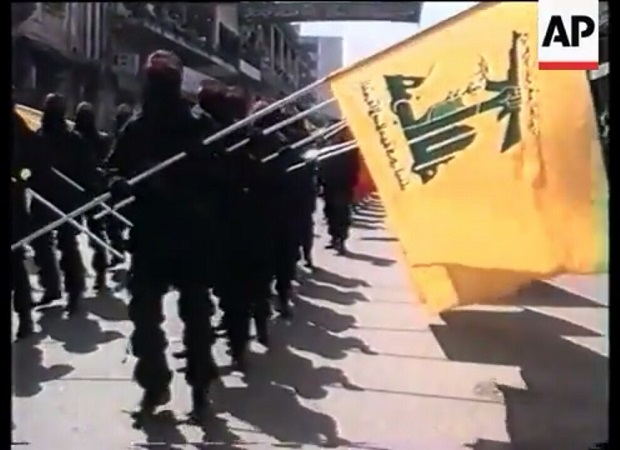Iran-Backed Hezbollah and Syria Likely Behind Billion Dollar Drugs Bust, Italian Police Say

Pro-Iranian terrorist group Hezbollah and the Iran-backed Syrian regime are behind a billion dollar drug bust made recently by the Italian police, news reports suggest. “The Italian police initially thought that Islamic State (ISIS) was behind the transaction. But after digging further, they pointed the finger at the regime of Syrian President Bashar Assad and his close Lebanese ally Hezbollah,” the Jerusalem Post reported Thursday.
“It is the largest haul ever seized, with a street value of more than $1bn” the BBC noted. The huge drug cache was part of the “lucrative narcotics trade likely run by the Syrian regime and its allies,” the broadcaster added.
Iran-backed Hezbollah, besides receiving generous funding from Tehran, has long relied on revenue from international drug trade and money-laundering for financing terrorism. The Shia-Islamic terror group has cultivated ties with Latin American cartels, smuggling drugs into Europe and the Middle East. The terrorist group, which used to get close to a billion dollars annually from Tehran, has been cash-strapped since President Donald Trump sanctioned the Iranian regime.
The Jerusalem Post reported:
Italy’s financial crimes unit detailed a large-scale drug trade believed to be originating out of Syria, according to an exclusive BBC report.During the summer, the Italian authorities said they had seized about 14 tonnes (15.4 US tons) of the amphetamine Captagon arriving from Syria – about 84 million pills, worth around $1 billion – in what they described as the world’s single largest operation of its kind.The Italian police initially thought that Islamic State (ISIS) was behind the transaction. But after digging further, they pointed the finger at the regime of Syrian President Bashar Assad and his close Lebanese ally Hezbollah.BBC Middle East correspondent Quentin Sommerville stated that drugs are a major source of funding for Syria and the Lebanese terrorist group. He added that not only was the drug bust in Italy linked to Syria and Hezbollah, but a “wave of others across the world” has also been associated with the groups. (…)Captagon is popular in the Middle East, and widespread in war-torn areas such as Syria, where conflict has fueled demand and created opportunities for producers.Production was initially concentrated in Lebanon, and ISIS sells it to finance its activities, the Police said in a statement. It said Captagon was known as the “drug of the Jihad” after being found in terrorist hideouts, including one used by the Islamists who killed 90 people at the Bataclan theater in Paris in 2015.Italian authorities believe the coronavirus lockdown across Europe has hindered the production and distribution of synthetic drugs, forcing traffickers to organize shipments from Syria, where these activities have not slowed down.
Europe bears some culpability in the Iran-backed terrorist group spreading its criminal tentacles across the continent. Despite U.S. pressure, the European Union refuses to place a complete ban on Hezbollah, allowing its “political” wing to freely operate in Europe.
The Lebanon-based Hezbollah was created by the Iranian regime in the 1980s as a proxy terrorist militia to wage war against Israel. The Shia-Islamic group entered the Syrian conflict on behalf of country’s Iran-backed dictator Bashar al-Assad. Hezbollah, which acts as a state within a state in Lebanon, now also controls large swaths in neighboring Syria and is answerable only to its paymasters in Tehran.
As recent developments show, Hezbollah is using its newly acquired territory in Syria for international drug trade and carrying out cross-border terror attacks into Israel.
A 2018 study published by the European Union found that “a large network of Lebanese nationals [were] offering money laundering services to organized crime groups in the EU and using a share of the profits to finance terrorism-related activities of the Lebanese Hezbollah’s military wing.” The report concluded that the “cooperation of these money-launderers and Hezbollah’s military wing was a clear example of a nexus between organized crime and terrorism.”
The U.S. Department of Environmental Affairs (DEA) has also confirmed Hezbollah’s drug trafficking operations based in Syria. Hezbollah “protects smuggling routes in the so-called Shia Crescent, including in Syria. Reporting indicates that marijuana, Captagon, and other drugs are now being heavily trafficked by Syrian military intelligence,” John Fernandez, head of the DEA’s Counter-Narcoterrorism Operations Center, said earlier this year. He added that the “Trump administration considers Hezbollah a high national security priority and has spearheaded a robust, cross-government effort aimed at stifling its activities.”
In recent months, the terrorist group has used Syrian territory, especially around the strategic Golan Heights, to stage attacks into Israel. Hezbollah has been backed by the Islamic Revolutionary Guard Corps (IRGC), the Iranian regime’s military arm, in these terrorist operations.
The Italian investigation once again shows how Iran-sponsored Hezbollah is exploiting Europe’s open borders to finance terrorism. The revelations also highlight the blurring lines between the group’s organized crime and jihad terrorism. As the German domestic intelligence agency BfV has repeatedly confirmed, Islamic terrorist groups and Arab crime families have been recruiting from the constant stream of migrant men coming into Europe.
“A Look Into Hezbollah’s Financial Mechanisms” (July 2019)
CLICK HERE FOR FULL VERSION OF THIS STORY